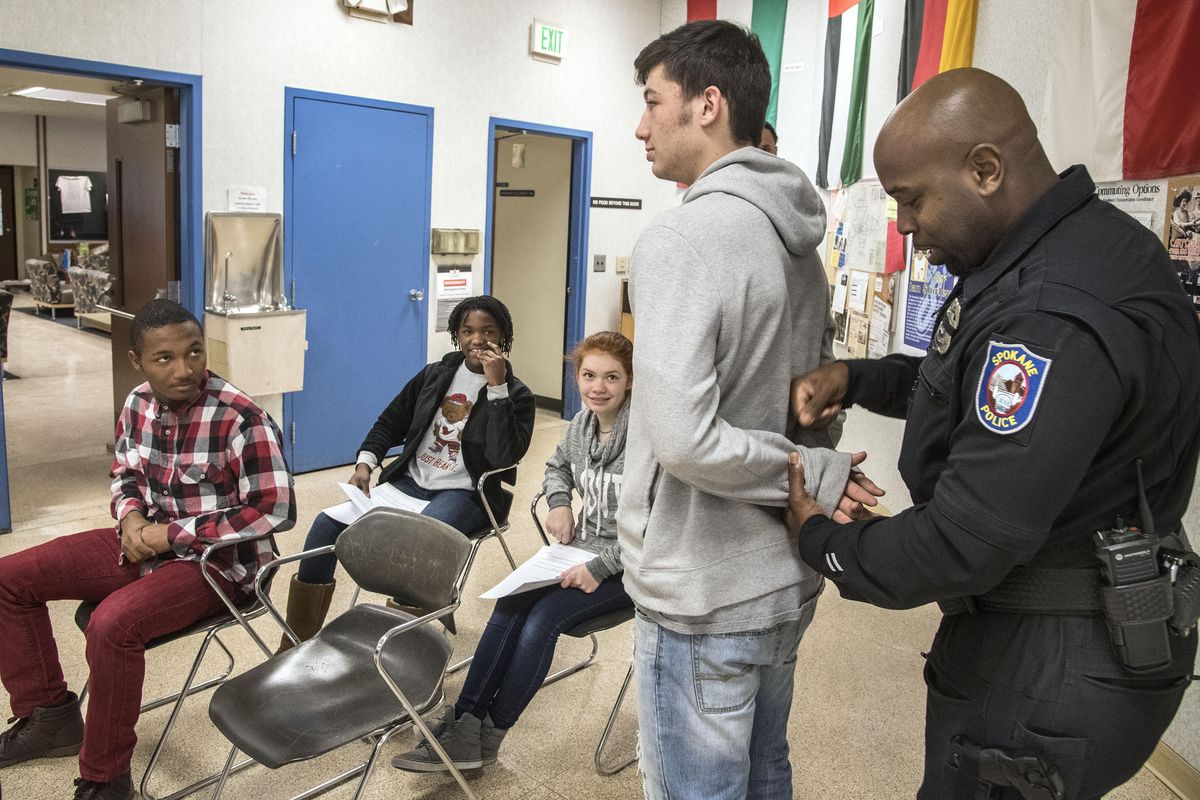Youth and Justice Forum introduces students who might not know a cop or a lawyer to both

Spokane police Officer Winston Brooks handcuffed the teenage driver of the car, then turned to the young woman in the back seat.
“What’s your name?” he asked.
“Jessica Simpson,” she replied.
The line drew laughs from the 200 students watching the interaction, which was a skit designed to teach teenagers how to interact with law enforcement during a traffic stop. The first lesson? Don’t give officers fake names.
Brooks and Coeur d’Alene police Officer Jacob Procter then spoke to the group, mostly high schoolers from Spokane Public Schools, about how they became police officers.
The students spent the day at Spokane Falls Community College for the third Youth and Justice Forum, an event designed to expose students who are underrepresented in criminal justice, law and law enforcement to professionals in those fields.
Some students may have had negative interactions with police in the past, while others are interested in a career but don’t have access to people they could ask about the profession.
“I wanted to be a lawyer when I was a little kid, but I never met one until I went to law school,” said Gloria Ochoa-Bruck, a former prosecutor and public defender who now works on multicultural affairs for the city. Ochoa-Bruck was part of a group that brought the forums to Spokane starting in 2014, modeled after a program in place in the Tri-Cities.
The program looks for speakers who had a more difficult or atypical path toward the careers they have now, she said.
“We try to find people who can relate to them,” she said.
Brooks recounted his childhood growing up in the inner city of Richmond, Virginia, where he often skipped school and stayed out late, driving around the neighborhood with friends.
“I was a knucklehead back in the day,” he said.
Brooks was a promising basketball player with scholarship offers up and down the East Coast, but said schools dropped interest in him when they found out about his 1.6 GPA. Thanks to a mentor who refused to let him stay in Virginia and stagnate, he ended up going to college, where he earned a 3.8 GPA his first semester.
Eventually, he found his way to Gonzaga, where he competed in the 2003 NCAA championships as a senior. After leaving college, he joined the Coeur d’Alene Police Department and transferred to Spokane in 2013.
“I know what you’re going through. I know what you can become,” Brooks told the group. “When you apply yourself, there’s nobody in this world that can tell you you can’t do something.”
Students answered trivia questions about the law between speakers and heard presentations from court interpreters, attorneys and officers, including a police dog handler. They also had time to mingle with dozens of representatives from the Air Force, state crime lab, prosecutor’s office and other jobs in the field.
Seattle and Yakima also have Youth and Justice forums, sponsored by the Washington State Minority and Justice Commission. Their hope is to encourage more diversity.
“The people who work in the court and the legal system should reflect the people who are served by it,” said Cynthia Delostrinos, who manages three Supreme Court commissions. That means reaching out to students from low-income families who likely don’t have parents who know lawyers personally, as well as students of color and women, she said.
During a lunch break, a trio of Ferris High School students sat at a table together and spoke about their ambitions for criminal justice careers.
Kristina Marshalkina, 18, came to the U.S. with her parents from Russia as a child. She wants to be a criminal psychologist and said she’d like to see a justice system that better represents everyone.
“If you came from a different place, you’re automatically retarded, you’re stupid, you don’t know what’s going on,” she said, speaking about ignorant comments she hears about Russians in Spokane.
Aundrea Destefano, 17, said she’d like to go into forensics and was interested in the science behind crime. Fellow junior Jaquill Fox, 16, said his family is close with Brooks’, which has motivated him to become a police officer.
Both are black and said they’re concerned about bias in the criminal justice system, driven by beliefs that all black people are involved in crime.
“Almost everywhere, people assume that African-Americans have guns or have drugs,” Destefano said.
But both said the individual officers they know in Spokane are fair and that trying to change the system by being a positive force inside it is important.
Brooks is involved in other police outreach with young people, which he juggles with his graveyard patrol shift.
“Most of them, they don’t trust the police still until they’ve made that personal connection,” he said. At the end of his talk, he gave out his cellphone number and told students to call him anytime if they needed someone to talk to.